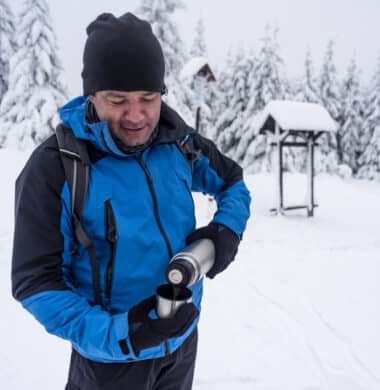Why Does My Blood Pressure Rise in Cold Weather?

Cold weather impacts your heart health in many ways. While the link between cold weather and an increased risk of heart attack has been widely documented, a lesser known risk associated with the cold is a rise in blood pressure. This is something individuals with high blood pressure must be acutely aware of, since it may impact the way you manage your condition.
Studies have demonstrated that a 1.8°F drop in average daily outdoor temperature is associated with a 0.26 mmHG increase in systolic blood pressure. For individuals with heart disease, the increase in blood pressure is even more pronounced.
How Does Cold Weather Impact Blood Pressure?
When the outdoor temperature is very cold, it causes your blood vessels to constrict. This increases the force required to push blood through your narrowed veins and arteries, which elevates your blood pressure.
Other potential reasons why your blood pressure rises in cold weather include:
- The activation of your sympathetic nervous system in response to stress associated with the cold
- The release of hormones and neurotransmitters, which speeds up your heart rate and increase stress on the heart
If your blood pressure is typically in the normal range, this temporary increase due to the cold weather is most likely not a cause for concern. However, if you struggle with high blood pressure, this increase can increase your risk of heart attack and stroke.
Risk of High Blood Pressure in Winter Is Highest Among Elderly People

For this reason, it’s critical for seniors to bundle up when going out in extremely cold weather. In addition, it’s important to be on the lookout for warning signs of a potential cardiac incident, such as shortness of breath and chest tightness, when engaging in strenuous physical activity in the cold.
Tips to Manage Your Blood Pressure in the Winter
If you suffer from high blood pressure, there are several steps you can take to help prevent the spikes that typically occur in the cold weather:
- Change your diet – Cold weather often makes us want to indulge in comfort foods, but this may cause your blood pressure to rise. Instead, eat a diet rich in fruits, vegetables, low-fat diary, fish, poultry and whole grains. Avoid salty foods since a low sodium diet will help you manage your high blood pressure.
- Reduce caffeine and alcohol consumption – Caffeine and alcohol both cause you to lose your body heat faster. Your heart will have to work harder to keep you warm, which may cause your blood pressure to rise.
- Minimize strenuous outdoor activities – Strenuous physical activity in cold weather can increase the stress on your circulatory system, causing your blood pressure to rise.
- Get plenty of exercise – While you want to minimize your strenuous activity outside in the cold, it’s still important to get plenty of exercise during the winter. This will improve your cardiovascular health and help you manage your blood pressure. Just make sure to get your exercise indoors.
- Conserve body heat – One way to combat a rise in blood pressure from cold weather is to keep your body as warm as possible whenever you’re outside. Bundle up in warm layers, and make sure to wear a hat and gloves. Your hvac system should be working properly to ensure your home has a comfortable temperature throughout the winter.
- Track your blood pressure diligently – Even when you take all the steps listed above, it’s still critical to monitor your blood pressure as diligently as possible during the winter. Try to monitor your blood pressure at various times of the day to get a clearer sense of how it fluctuates throughout the day.
South Denver Cardiology Can Help You Manage Your High Blood Pressure
At South Denver Cardiology, we offer a variety of services to help you manage your high blood pressure and improve your heart health. Our pulmonary hypertension center offers a wide range of treatments that will address high blood pressure and help you manage your condition all winter when you’re at elevated risk.
In addition, our diagnostic testing can help you identify potential cardiovascular issues in their early stages. You can also take advantage of our nutritional counseling to establish a diet that will more effectively manage your blood pressure during the winter months. Stop by our medical fitness gym to get in regular workouts designed to keep your heart healthy and your blood pressure under control.
Contact us today to schedule an appointment.
- 9 Tips to Reduce Holiday Stress - December 11, 2025
- 6 Tips for Exercising Outdoors with a Heart Condition - May 19, 2025
- Lifestyle Changes That Can Help Manage Arrhythmia - April 30, 2025
Sign Up
As with any health concerns, your specific treatment program should be discussed thoroughly with your primary care physician as well as any specialists who may need to be consulted – like a cardiologist.
Sign Up
